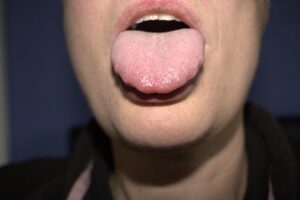Have you ever woken up to notice that the usual smooth appearance of your tongue has changed? If you see rippled indents at the edge of your tongue, you do not need to worry. These are impressions of your teeth along the edge of the tongue.
Normally, your healthy tongue can return to its original shape after it meets your teeth. A scalloped tongue can be a sign of underlying oral health concerns. If you notice a scalloped tongue frequently, you may want to speak to your dentist. Read on to learn about four potential causes of this rippled effect in your tongue.

Dehydration
Dehydration is one of the primary causes of a scalloped tongue. If your body does not have enough water, you can see some adverse effects in your organs. Swelling might occur, including in your tongue, as an automatic effort to retain moisture.
When the tongue grows larger, it will press against the back of your teeth, leaving these indents behind on the organ. Make sure you drink plenty of water to prevent this change in your tongue’s appearance and to avoid other potential dangers from low hydration levels.
Bruxism
Clenching and grinding your teeth, a behavior known as bruxism, is a common habit. But the constant grating of the teeth against each other will exert harmful pressure on your teeth. This could potentially injure a tooth, but it will also press against the tongue to make it appear scalloped.
Many people do not realize they have bruxism because it can often present at night when a patient is asleep. A scalloped tongue might be the only sign that they exhibit this harmful behavior. Your dentist might suggest sleeping with a night guard to prevent dangers from nighttime teeth grinding.
Sleep Apnea
Obstructive sleep apnea is a type of sleep disorder in which the tissue at the back of the throat will relax and collapse while you sleep. This creates a blockage in the airway that makes you briefly stop breathing. While not acutely life-threatening, the episode can put a strain on the body that might encourage the tongue to press against the teeth, leaving it looking scalloped.
Do not ignore signs of sleep apnea like a scalloped tongue. Your dentist can help you treat this disorder so that you can avoid medical consequences that might otherwise arise.
Underlying Medical Issues
Sometimes, a scalloped tongue can be a sign of nutritional deficiencies. Stick to a balanced and nutritious diet to keep your tongue and the rest of your body healthy. Your dentist can offer advice about how your diet can influence your oral health at your next routine dental check-up.
Hypothyroidism and other medical conditions can also create swelling in the tongue and elsewhere in the body that might make the tongue look scalloped. Because of this possibility, you should not ignore a scalloped tongue, especially if the symptom becomes chronic. Discuss changes in your oral health with your dentist as soon as you can.

